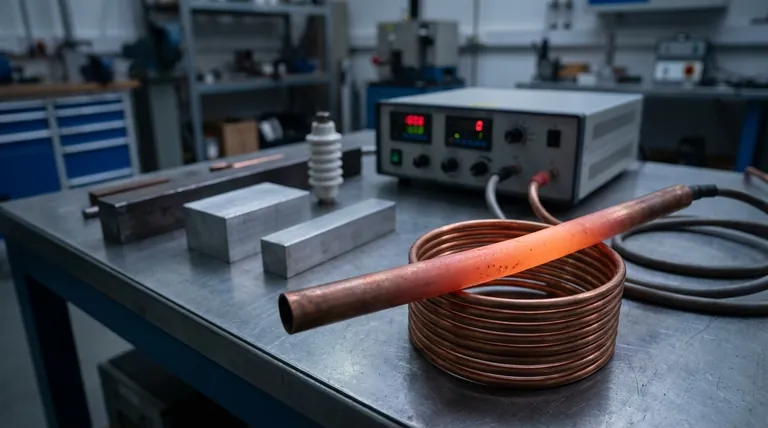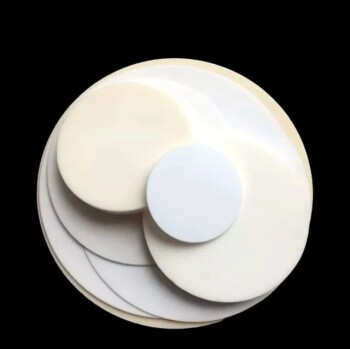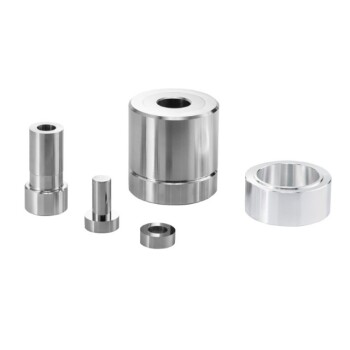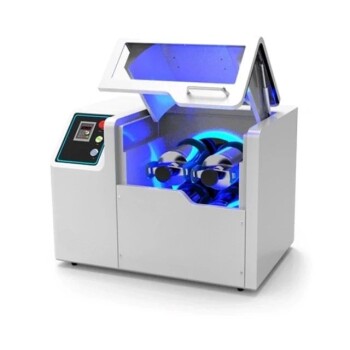In principle, any electrically conductive material can be heated by induction. However, the efficiency varies so dramatically between metals that some, like copper, gold, and aluminum, are considered highly impractical to heat without specialized equipment. The materials that truly cannot be induction heated are electrical insulators like plastics, ceramics, glass, and wood.
The effectiveness of induction heating is not determined by a metal's ability to conduct electricity, but by two key properties: its electrical resistivity and its magnetic permeability. A high value in either of these properties is what allows a metal to heat up quickly and efficiently.

The Two Heating Mechanisms at Play
To understand why some metals are poor candidates, you must first understand how induction generates heat. It relies on two distinct physical phenomena that happen simultaneously.
1. Heating from Eddy Currents
An induction coil generates a powerful, rapidly alternating magnetic field. When you place a metal part inside this field, it induces small, circular electrical currents within the metal, known as eddy currents.
Every metal has some level of electrical resistance. As these eddy currents flow against this resistance, they generate friction and therefore heat. This is called Joule heating, and it occurs in any conductive material placed in the field.
2. Heating from Hysteresis
This second, more powerful mechanism only occurs in ferromagnetic metals like iron and certain types of steel. These materials are composed of tiny magnetic regions called domains.
The rapidly alternating magnetic field forces these magnetic domains to flip back and forth millions of times per second. This rapid realignment creates immense internal friction, which generates significant heat. This hysteresis heating is far more efficient than heating by eddy currents alone.
Why Some Metals Heat Better Than Others
A metal's suitability for induction heating is a direct result of its inherent physical properties and how they interact with these two heating mechanisms.
Factor 1: Electrical Resistivity (ρ)
Contrary to intuition, metals with higher electrical resistivity heat more effectively from eddy currents.
Think of it like rubbing your hands together to create warmth. A low-resistance material like copper is like rubbing two smooth, oiled surfaces together—there's very little friction. A higher-resistance material like steel is like rubbing two rough, dry surfaces together, generating much more heat for the same effort.
This is why copper and aluminum, which are excellent electrical conductors (low resistivity), are very difficult to heat with induction. The induced eddy currents flow with very little resistance and therefore generate minimal heat.
Factor 2: Magnetic Permeability (μ)
Magnetic permeability is a measure of how easily a material can be magnetized. Ferromagnetic materials like carbon steel have a very high permeability.
High permeability acts as a "magnetic amplifier," concentrating the magnetic field and inducing much stronger eddy currents. More importantly, it enables the powerful hysteresis heating effect.
This is the primary reason why carbon steel heats exceptionally well with induction, while non-magnetic stainless steel, aluminum, and copper (which have low permeability) do not benefit from this effect and heat much more slowly.
The Curie Point: A Critical Transition
For magnetic materials, there is a critical temperature known as the Curie Point (around 770°C / 1420°F for steel). Above this temperature, the material loses its magnetic properties.
When this happens, all hysteresis heating instantly stops. The heating process continues via eddy currents alone, but the rate of heating drops significantly. This is a critical consideration for processes like hardening and heat treating.
A Practical Ranking of Metals for Induction
Here is a general classification of common metals based on their typical response to induction heating.
Excellent Candidates
These materials have both high magnetic permeability and high electrical resistivity, making them ideal.
- Carbon Steels (e.g., 1045, 4140)
- Cast Iron
- Powdered Metals
Good Candidates
These materials are either magnetic with lower resistivity or non-magnetic with higher resistivity.
- Magnetic Stainless Steels (e.g., 400 series)
- Nickel
- Titanium
Challenging Candidates (Often Considered "Cannot Heat")
These materials have low magnetic permeability and very low electrical resistivity, making them extremely inefficient to heat. Specialized high-frequency or high-power equipment is often required.
- Aluminum
- Brass
- Copper
- Gold & Silver
- Non-Magnetic Stainless Steels (e.g., 304, 316)
Understanding the Trade-offs
Simply classifying metals is not enough; practical application requires nuance. The choice of equipment, specifically the frequency of the alternating current, can help overcome a material's poor properties.
Skin Effect and Frequency
Induction currents flow most densely at the surface of a part, a phenomenon known as the skin effect. The depth of this heated layer is determined by the frequency of the power supply.
Higher frequencies create a thinner skin effect. This is essential for heating low-resistivity metals like aluminum and copper. By concentrating the energy in a very shallow layer, you can achieve effective heating that would be impossible at lower frequencies.
This means that while aluminum is a "challenging" material, it can be heated effectively for applications like brazing or shrink-fitting if you use the right high-frequency induction system.
Making the Right Choice for Your Process
Your decision should be based on your material and your desired outcome.
- If your primary focus is rapid, efficient heating for hardening or forging: Prioritize ferromagnetic materials like carbon steel and cast iron, as they benefit from both hysteresis and eddy current heating.
- If you must heat a non-magnetic metal like aluminum or copper: Be prepared to use a higher-power and higher-frequency induction system to overcome the material's low resistivity.
- If you are working with stainless steel: First identify if it is a magnetic (400 series) or non-magnetic (300 series) grade, as their heating performance will differ dramatically.
- If you are heat-treating steel past its Curie Point: Account for the significant drop in heating efficiency in your process calculations and power settings.
By understanding that a material's resistance—not its conductivity—is the key, you can make informed decisions about material selection and process design.
Summary Table:
| Material Suitability | Key Metals | Primary Heating Mechanism |
|---|---|---|
| Excellent Candidates | Carbon Steels, Cast Iron | Hysteresis & Eddy Currents |
| Good Candidates | Magnetic Stainless Steels, Nickel | Primarily Eddy Currents |
| Challenging Candidates | Aluminum, Copper, Brass | Eddy Currents (requires high frequency) |
| Cannot Be Heated | Plastics, Ceramics, Wood | N/A (Electrical Insulators) |
Struggling to heat challenging metals like aluminum or copper in your lab processes? KINTEK specializes in high-performance lab equipment, including advanced induction heating systems designed for a wide range of materials. Our expertise ensures you get the right solution for efficient, precise heating—whether you're working with carbon steel or non-magnetic alloys. Contact us today to optimize your heating process and enhance your lab's capabilities! Reach out via our contact form for a personalized consultation.
Visual Guide

Related Products
- Silicon Carbide SiC Thermal Heating Elements for Electric Furnace
- HFCVD Machine System Equipment for Drawing Die Nano-Diamond Coating
- Anti-Cracking Press Mold for Lab Use
- Engineering Advanced Fine Ceramics Aluminum Oxide Al2O3 Heat Sink for Insulation
- Ring Press Mold for Lab Applications
People Also Ask
- What is the maximum temperature for silicon carbide heating element? The Real Limit for Your High-Temp Furnace
- What is SiC melting point? Discover the Extreme Thermal Stability of Silicon Carbide
- What material is used for making heating element? Choose the Right Alloy for Your Application
- What is silicon carbide rod heated to high temperature used as? A Premier Heating Element for Extreme Environments
- What is a silicon carbide heating element? Unlock Extreme Heat for Industrial Processes



















